Selecting a Research Approach: Paradigm, Methodology and Methods
22 Pages8165 Words316 Views
Added on 2023-04-20
About This Document
This chapter discusses the importance of selecting a research approach and the role of paradigm, methodology, and methods in conducting research. It explores different paradigms such as positivism, post-positivism, constructivism, transformative/emancipatory, and postcolonial indigenous research paradigm. The chapter also delves into the philosophical assumptions about perceptions of reality, what counts as truth, and the value systems in each of these paradigms.
Selecting a Research Approach: Paradigm, Methodology and Methods
Added on 2023-04-20
ShareRelated Documents
See discussions, stats, and author profiles for this publication at: https://www.researchgate.net/publication/257944787
Selecting a research approach: Paradigm, methodology and methods
Chapter · January 2012
CITATIONS
6
READS
135,097
1 author:
Some of the authors of this publication are also working on these related projects:
Research methods pedagogy View project
Barbara Kawulich
University of West Georgia
37 PUBLICATIONS 586 CITATIONS
SEE PROFILE
All content following this page was uploaded by Barbara Kawulich on 08 October 2015.
The user has requested enhancement of the downloaded file.
Selecting a research approach: Paradigm, methodology and methods
Chapter · January 2012
CITATIONS
6
READS
135,097
1 author:
Some of the authors of this publication are also working on these related projects:
Research methods pedagogy View project
Barbara Kawulich
University of West Georgia
37 PUBLICATIONS 586 CITATIONS
SEE PROFILE
All content following this page was uploaded by Barbara Kawulich on 08 October 2015.
The user has requested enhancement of the downloaded file.
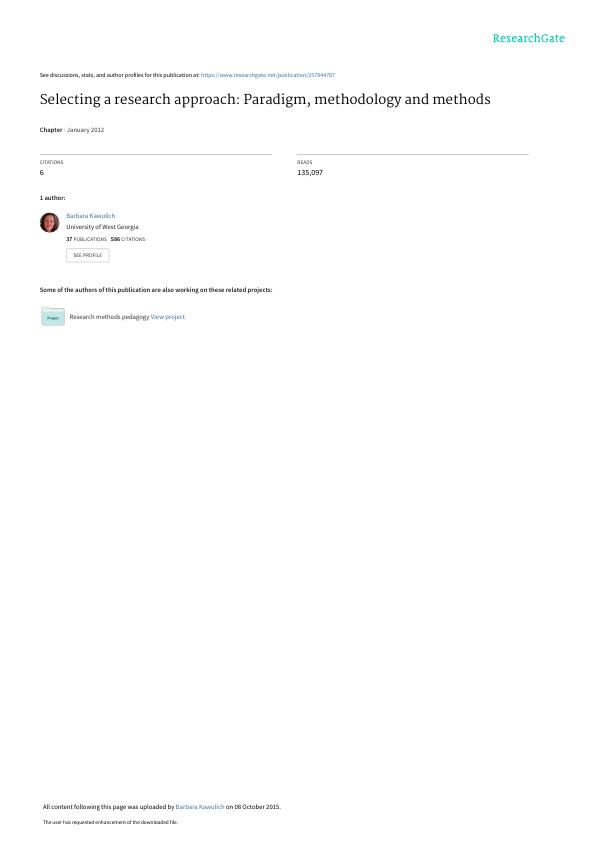
1
CHAPTER 3
Selecting a research approach: paradigm, methodology and methods
Bagele Chilisa
Barbara Kawulich
Once you have a topic in mind to study, you must consider how you want to go about investigating it.
Your approach will depend upon how you think about the problem and how it can be studied, such
that the findings are credible to you and others in your discipline. Every researcher has his/her own
view of what constitutes truth and knowledge. These views guide our thinking, our beliefs, and our
assumptions about society and ourselves, and they frame how we view the world around us, which is
what social scientists call a paradigm (Schwandt, 2001). In his monograph The Structure of Scientific
Revolutions (1962), Thomas Kuhn used the term ‘paradigm’ in two ways:
1. to represent a particular way of thinking that is shared by a community of scientists in
solving problems in their field and
2. to represent the “commitments, beliefs, values, methods, outlooks and so forth
shared across a discipline” (Schwandt, 2001, p. 183-4).
A paradigm is a way of describing a world view that is informed by philosophical assumptions about
the nature of social reality (known as ontology – that is, what do we believe about the nature of
reality?), ways of knowing (known as epistemology – that is, how do we know what we know?), and
ethics and value systems (known as axiology – that is, what do we believe is true?) (Patton, 2002). A
paradigm thus leads us to ask certain questions and use appropriate approaches to systematic inquiry
(known as methodology – that is, how should we study the world?). Ontology relates to whether we
believe there is one verifiable reality or whether there exist multiple, socially constructed realities
(Patton, 2002). Epistemology inquires into the nature of knowledge and truth. It asks the following
questions: What are the sources of knowledge? How reliable are these sources? What can one
know? How does one know if something is true? For instance, consider that some people think that
A paradigm is a shared world view that represents the beliefs and
values in a discipline and that guides how problems are solved
(Schwandt, 2001).
CHAPTER 3
Selecting a research approach: paradigm, methodology and methods
Bagele Chilisa
Barbara Kawulich
Once you have a topic in mind to study, you must consider how you want to go about investigating it.
Your approach will depend upon how you think about the problem and how it can be studied, such
that the findings are credible to you and others in your discipline. Every researcher has his/her own
view of what constitutes truth and knowledge. These views guide our thinking, our beliefs, and our
assumptions about society and ourselves, and they frame how we view the world around us, which is
what social scientists call a paradigm (Schwandt, 2001). In his monograph The Structure of Scientific
Revolutions (1962), Thomas Kuhn used the term ‘paradigm’ in two ways:
1. to represent a particular way of thinking that is shared by a community of scientists in
solving problems in their field and
2. to represent the “commitments, beliefs, values, methods, outlooks and so forth
shared across a discipline” (Schwandt, 2001, p. 183-4).
A paradigm is a way of describing a world view that is informed by philosophical assumptions about
the nature of social reality (known as ontology – that is, what do we believe about the nature of
reality?), ways of knowing (known as epistemology – that is, how do we know what we know?), and
ethics and value systems (known as axiology – that is, what do we believe is true?) (Patton, 2002). A
paradigm thus leads us to ask certain questions and use appropriate approaches to systematic inquiry
(known as methodology – that is, how should we study the world?). Ontology relates to whether we
believe there is one verifiable reality or whether there exist multiple, socially constructed realities
(Patton, 2002). Epistemology inquires into the nature of knowledge and truth. It asks the following
questions: What are the sources of knowledge? How reliable are these sources? What can one
know? How does one know if something is true? For instance, consider that some people think that
A paradigm is a shared world view that represents the beliefs and
values in a discipline and that guides how problems are solved
(Schwandt, 2001).

2
the notion that witches exist is just a belief. Epistemology asks further questions: Is a belief true
knowledge? Or is knowledge only that which can be proven using concrete data? For example, if you
say witches exist, what is the source of your evidence? What methods can you use to find out about
their existence? Together, these paradigmatic aspects help to determine the assumptions and beliefs
that frame a researcher’s view of a research problem, how he/she goes about investigating it, and the
methods he/she uses to answer the research questions.
The objectives of this chapter are to:
1. Describe the following paradigms: positivism/post-positivism,
constructivism/interpretativism, transformative/emancipatory and postcolonial
indigenous research paradigm.
2. Describe philosophical assumptions about perceptions of reality, what counts as truth
and value systems in each of the paradigms.
3. Demonstrate the relationship between paradigm and methodology.
PARADIGM, METHODOLOGY AND METHODS
Particular paradigms may be associated with certain methodologies. For example, as will be
discussed in more detail later in this chapter, a positivistic paradigm typically assumes a quantitative
methodology, while a constructivist or interpretative paradigm typically utilizes a qualitative
methodology. This is not universally the case, however; there are instances in which one may pursue
an interpretative study using a quantitative methodology. No one paradigmatic or theoretical
framework is ‘correct’ and it is your choice to determine your own paradigmatic view and how that
informs your research design to best answer the question under study. How you view what is real,
what you know and how you know it, along with the theoretical perspective(s) you have about the
topic under study, the literature that exists on the subject, and your own value system work together to
help you select the paradigm most appropriate for you to use (See Figure 3.1).
the notion that witches exist is just a belief. Epistemology asks further questions: Is a belief true
knowledge? Or is knowledge only that which can be proven using concrete data? For example, if you
say witches exist, what is the source of your evidence? What methods can you use to find out about
their existence? Together, these paradigmatic aspects help to determine the assumptions and beliefs
that frame a researcher’s view of a research problem, how he/she goes about investigating it, and the
methods he/she uses to answer the research questions.
The objectives of this chapter are to:
1. Describe the following paradigms: positivism/post-positivism,
constructivism/interpretativism, transformative/emancipatory and postcolonial
indigenous research paradigm.
2. Describe philosophical assumptions about perceptions of reality, what counts as truth
and value systems in each of the paradigms.
3. Demonstrate the relationship between paradigm and methodology.
PARADIGM, METHODOLOGY AND METHODS
Particular paradigms may be associated with certain methodologies. For example, as will be
discussed in more detail later in this chapter, a positivistic paradigm typically assumes a quantitative
methodology, while a constructivist or interpretative paradigm typically utilizes a qualitative
methodology. This is not universally the case, however; there are instances in which one may pursue
an interpretative study using a quantitative methodology. No one paradigmatic or theoretical
framework is ‘correct’ and it is your choice to determine your own paradigmatic view and how that
informs your research design to best answer the question under study. How you view what is real,
what you know and how you know it, along with the theoretical perspective(s) you have about the
topic under study, the literature that exists on the subject, and your own value system work together to
help you select the paradigm most appropriate for you to use (See Figure 3.1).
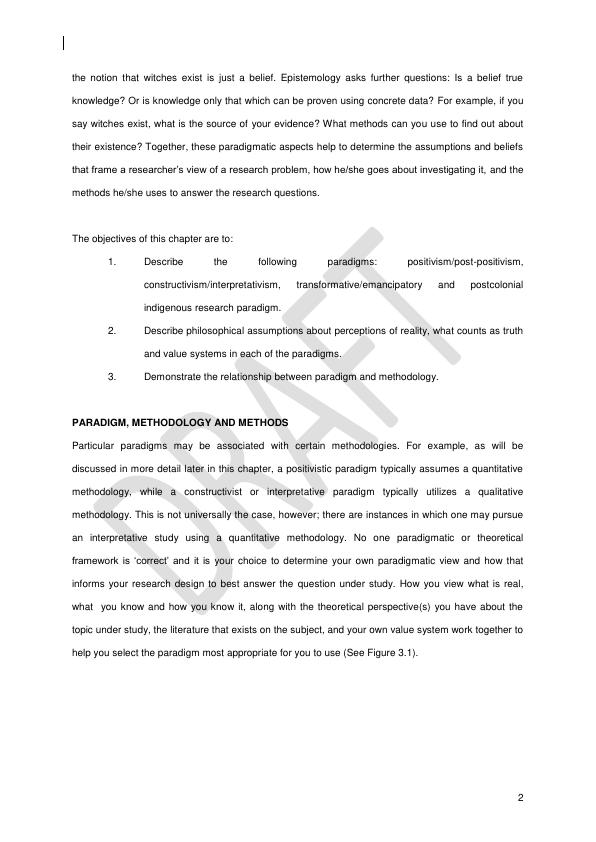
3
Figure 3.1 Factors influencing the choice of a paradigm
The methodology summarizes the research process, that is, how the research will proceed. Deciding
on a methodology starts with a choice of the research paradigm that informs the study. The
methodological process, therefore, is guided by philosophical beliefs about the nature of reality,
knowledge, and values and by the theoretical framework that informs comprehension, interpretation,
choice of literature and research practice on a given topic of study (see Figure 3.2). Methodology is
where assumptions about the nature of reality and knowledge, values, and theory and practice on a
given topic come together. Figure 3.2 illustrates the relationship. Methods are the means used for
gathering data and are an important part of the methodology.
Figure 3.1 Factors influencing the choice of a paradigm
The methodology summarizes the research process, that is, how the research will proceed. Deciding
on a methodology starts with a choice of the research paradigm that informs the study. The
methodological process, therefore, is guided by philosophical beliefs about the nature of reality,
knowledge, and values and by the theoretical framework that informs comprehension, interpretation,
choice of literature and research practice on a given topic of study (see Figure 3.2). Methodology is
where assumptions about the nature of reality and knowledge, values, and theory and practice on a
given topic come together. Figure 3.2 illustrates the relationship. Methods are the means used for
gathering data and are an important part of the methodology.
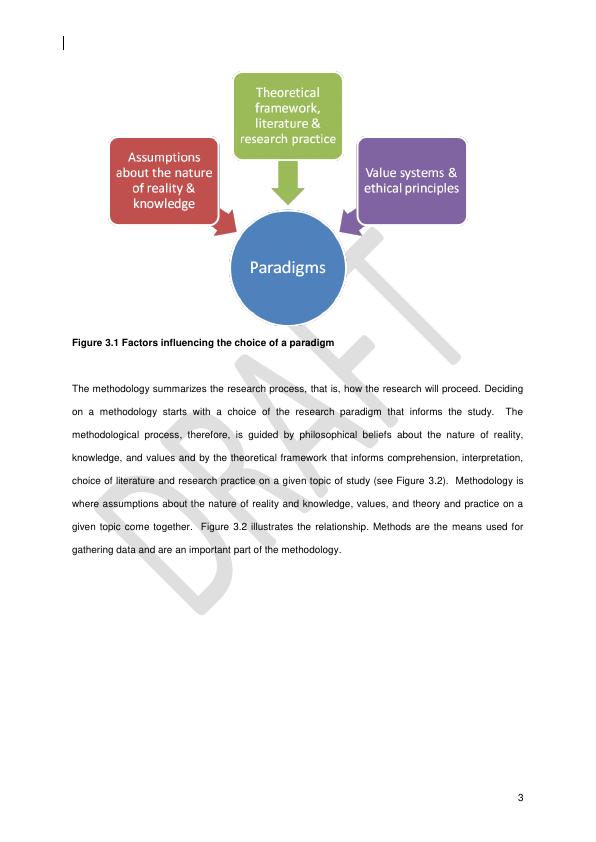
4
Figure 3.2 Methodology as convergence of three parts
Building the methodology of a study begins with a standpoint on the following questions:
Paradigm: What paradigm informs your methodology? To help you determine which paradigms may
fit your beliefs about truth, we will discuss some prevalent paradigms later in this chapter.
Theoretical Framework: What theories inform the choice of your research topic, the research
questions you ask, the literature reviewed, data collection methods, analysis and
interpretation?
Research Approach: What research approach is called for, based on the research questions
developed from the theoretical framework?
Data collection: What types and sources of data might you be able to use to help answer your
research questions? What are the best ways to collect data for your study? What
assumptions guide the choice of selection of participants in the study (sampling), the setting
of the study, and the techniques of data collection?
Data Analysis: How does theory inform your approach to data analysis and interpretation?
Ethics: What are the ethical considerations for your study, based on the paradigm, theoretical
framework, research approach, data collection and analysis?
Validity: By what and whose standards are the design, data collection, analysis and interpretation of
research findings deemed valid and reliable?
Figure 3.2 Methodology as convergence of three parts
Building the methodology of a study begins with a standpoint on the following questions:
Paradigm: What paradigm informs your methodology? To help you determine which paradigms may
fit your beliefs about truth, we will discuss some prevalent paradigms later in this chapter.
Theoretical Framework: What theories inform the choice of your research topic, the research
questions you ask, the literature reviewed, data collection methods, analysis and
interpretation?
Research Approach: What research approach is called for, based on the research questions
developed from the theoretical framework?
Data collection: What types and sources of data might you be able to use to help answer your
research questions? What are the best ways to collect data for your study? What
assumptions guide the choice of selection of participants in the study (sampling), the setting
of the study, and the techniques of data collection?
Data Analysis: How does theory inform your approach to data analysis and interpretation?
Ethics: What are the ethical considerations for your study, based on the paradigm, theoretical
framework, research approach, data collection and analysis?
Validity: By what and whose standards are the design, data collection, analysis and interpretation of
research findings deemed valid and reliable?
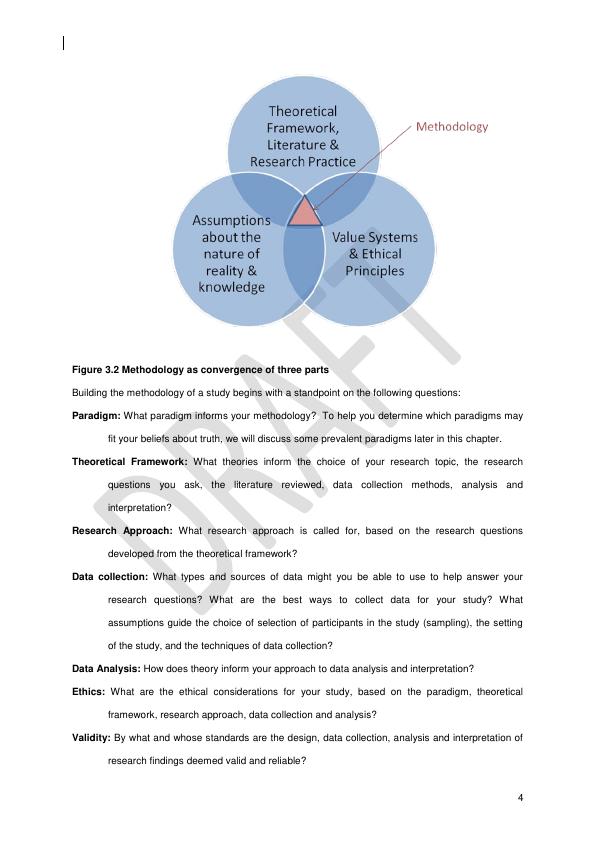
5
PARADIGMS AND PHILOSOPHICAL UNDERPINNINGS
What follows is a discussion of the positivism, post-positivism, constructivism, transformative, and
postcolonial indigenous paradigms, along with the philosophical assumptions about perceptions of
reality, what counts as truth, and the value systems in each of these paradigms. It is important to note
that a number of philosophers working over a long period of time contributed towards the thinking,
knowledge, and worldviews embodied in each paradigm.
See Table 3.1 for a summary of the paradigms selected for comparison; the list is not exhaustive. The
paradigms chosen for discussion in this chapter are simply some of the most frequently used
frameworks of assumptions.
Table 3.1 Comparison of selected paradigms (Chilisa, 2011)
POSITIVIST/
POST-
POSITIVIST
PARADIGM
CONSTRUCTIVIST/
INTERPRETATIVE
PARADIGM
TRANSFORMATIVE/
EMANCIPATORY
PARADIGM
POSTCOLONIAL/
INDIGENOUS
RESEARCH
PARADIGM
Reason for
doing the
research
To discover
laws that are
generalizable
and govern the
universe
To understand and
describe human
nature
To destroy myths
and empower people
to change society
radically
To challenge
deficit thinking
and pathological
descriptions of the
former colonized
and reconstruct a
body of
knowledge that
carries hope and
promotes
transformation
and social change
among the
historically
oppressed
Philosophical
underpinnings
Informed
mainly by
realism,
idealism and
critical realism
Informed by
hermeneutics and
phenomenology
Informed by critical
theory, postcolonial
discourses, feminist
theories, race-
specific theories and
neo-Marxist theories
Informed by
indigenous
knowledge
systems, critical
theory,
postcolonial
discourses,
feminist theories,
critical race-
PARADIGMS AND PHILOSOPHICAL UNDERPINNINGS
What follows is a discussion of the positivism, post-positivism, constructivism, transformative, and
postcolonial indigenous paradigms, along with the philosophical assumptions about perceptions of
reality, what counts as truth, and the value systems in each of these paradigms. It is important to note
that a number of philosophers working over a long period of time contributed towards the thinking,
knowledge, and worldviews embodied in each paradigm.
See Table 3.1 for a summary of the paradigms selected for comparison; the list is not exhaustive. The
paradigms chosen for discussion in this chapter are simply some of the most frequently used
frameworks of assumptions.
Table 3.1 Comparison of selected paradigms (Chilisa, 2011)
POSITIVIST/
POST-
POSITIVIST
PARADIGM
CONSTRUCTIVIST/
INTERPRETATIVE
PARADIGM
TRANSFORMATIVE/
EMANCIPATORY
PARADIGM
POSTCOLONIAL/
INDIGENOUS
RESEARCH
PARADIGM
Reason for
doing the
research
To discover
laws that are
generalizable
and govern the
universe
To understand and
describe human
nature
To destroy myths
and empower people
to change society
radically
To challenge
deficit thinking
and pathological
descriptions of the
former colonized
and reconstruct a
body of
knowledge that
carries hope and
promotes
transformation
and social change
among the
historically
oppressed
Philosophical
underpinnings
Informed
mainly by
realism,
idealism and
critical realism
Informed by
hermeneutics and
phenomenology
Informed by critical
theory, postcolonial
discourses, feminist
theories, race-
specific theories and
neo-Marxist theories
Informed by
indigenous
knowledge
systems, critical
theory,
postcolonial
discourses,
feminist theories,
critical race-
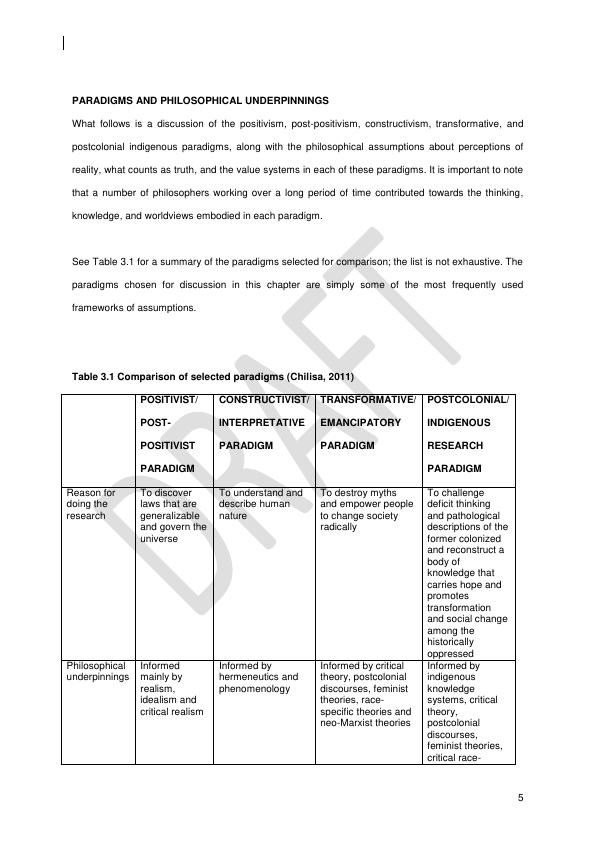
End of preview
Want to access all the pages? Upload your documents or become a member.
Related Documents
Understanding Ontology, Epistemology, and Methodology in Researchlg...
|9
|3388
|132
Sources of Knowledge in Sociologylg...
|4
|713
|85
Worldview Influencing Research Interestslg...
|4
|766
|61
